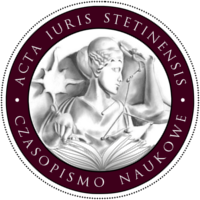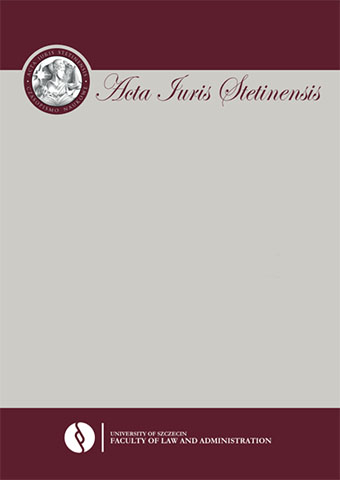| 1. | Albański, Ł. and Krywult-Albańska, M., Adopcje międzynarodowe jako zaniedba¬ny obszar badań nad migracjami, “Studia Migracyjne - Przegląd Polonijny” 2016, No. 3(161). |
| 2. | Ambroziak, A., Dudy gra wyborcza zakazem adopcji. To okrutne. Prezydent odbiera dzie¬ciom prawo do rodziny, 06.07.2020, OKO.press, https://oko.press/dudy-gra-wyborcza- -zakazem-adopcji/. |
| 3. | Andrzejewska, M., Osobista styczność z dzieckiem w przypadku spraw o przysposobienie międzynarodowe jako narzędzie chroniące dobro dziecka, “Białostockie Studia Praw¬nicze” 2017, No. 3. |
| 4. | Andrzejewski, M., Przysposobienie - podstawowe informacje i najważniejsze płaszczyzny sporów prawnych, in: Andrzejewski, M. and Łączkowska, M. (eds.), Prawne i poza-prawne aspekty adopcji, Poznań 2008. |
| 5. | Averett, P. et al., An evaluation of gay/lesbian and heterosexual adoption, “Adoption Qu- arterly” 2009, Vol. 12. |
| 6. | Bridge, C. and Swindells, H.Q.C., The modern law, Bristol 2003. |
| 7. | Ciepła, H. et al., Kodeks rodzinny i opiekuńczy. Komentarz, Warszawa 2011. |
| 8. | Arguments for and againstgay adoption, Debating Europe, https://www.debatingeurope. eu/focus/arguments-gay-adoption/#.XyEffy0lD7m. |
| 9. | Gajda, J., Kodeks rodzinny i opiekuńczy. Komentarz, Warszawa 2000. |
| 10. | Gajda, J., Przysposobienie dziecka w prawie polskim, in: Kasprzyk, P. (ed.), Prawo rodzin¬ne w Polsce i w Europie, Lublin 2005. |
| 11. | Hole wińska-Łapińska, E., ‘Adopcje zagraniczne’ w praktyce polskich sądów, Warszawa 1998. |
| 12. | Holewińska-Łapińska, E., in: Smyczyński, T. (ed.), System prawa prywatnego. Prawo ro-dzinne i opiekuńcze. Tom. 12, Warszawa 2011. |
| 13. | Ignaczewski, J., Kodeks rodzinny i opiekuńczy. Komentarz, Warszawa 2010. |
| 14. | Ignatowicz, J. and Nazar M., Prawo rodzinne, Warszawa 2016. |
| 15. | Kalus, S. and Habdas, M., Family and succession law in Poland, Alphen aan den Rijn 2020. |
| 16. | Knuiman, S. et al., Children without parental care in Poland: foster care, institutionaliza- tion and adoption, “International Social Work” 2015, Vol. 58 (1). |
| 17. | Kolańczyk, K., Prawo rzymskie, Warszawa 2007. |
| 18. | Krawczak, A., Adopcje zagraniczne - gdzie tkwi problem, 25.01.2017, Krytyka Polityczna, http://krytykapolityczna.pl/kraj/adopcje-zagraniczne-gdzie-tkwi-problem/. |
| 19. | Kuryłowicz, M., Rozwój historyczny rzymskiej adopcji, “Studia Iuridica Lublinensia” 2011, No. 16. |
| 20. | Lind, J. and Johansson, S., Preservation of the child’s background in in - and intercoun- try adoption, “The International Journal of Children’s Rights” 2009, Vol. 17, No. 2. |
| 21. | Łukasiewicz, R., Dobro dziecka a interesy innych podmiotów w polskiej regulacji prawnej przysposobienia, Warszawa 2019. |
| 22. | McCreery Bunkers, K. et al., International adoption and child protection in Guatemala. A case of the tail wagging the dog, “International Social Work” 2009, Vol. 52 (5). |
| 23. | Mignot, J., Why is intercountry adoption declining worldwide? “Population & Societies” 2015, No. 519. |
| 24. | Mozgawa, M., Komentarz do art. 211a k.k., in: Mozgawa, M. (ed.), Kodeks karny. Komen¬tarz aktualizowany, LEX 2020. |
| 25. | Nazaruk, P., Komentarz do art. 26 k.c., in: Ciszewski, J. and Nazaruk, P. (eds.), Kodeks cy¬wilny. Komentarz, LEX 2019. |
| 26. | Partyk, A., Specyfika przysposobienia wspólnego, LEX 2020. |
| 27. | Pawłowska, D., Droga do domu. Adopcje w Polsce i na świecie, 06.02.2017, wyborcza.pl, http://biqdata.wyborcza.pl/biqdata/7,159116,22156657,droga-do-domu-adopcje-w- polsce-i-na-swiecie.html. |
| 28. | Selman, P., Key tables for intercountry adoption: receiving states 2003-2013 and states of origin 2003-2013, Newcastle University 2014. |
| 29. | Shapiro, L.M., Inferring a right to permanent family care from the United Nations Co- nvention on the Rights of the Child, the Hague Convention on Intercountry Adoption, and selected scientific literature, “Washington and Lee Journal of Civil Rights and So- cial Justice” 2008, Vol. 15, No. 1. |
| 30. | Smyczyński, T., Prawo rodzinne i opiekuńcze, Warszawa 2018. |
| 31. | Stojanowska, S., Rozwód a dobro dziecka, Warszawa 1979. |
| 32. | Strzebinczyk, J.F., Prawo rodzinne, Warszawa 2016. |
| 33. | Świętochowska, E., Trudniej o adopcje zagraniczne, 29.01.2018, Gazeta Prawna, https:// prawo.gazetaprawna.pl/artykuly/1100746,adopcje-zagraniczne-prawo.html. |
| 34. | To krzywda dla dzieci, “Niedziela Ogólnopolska” 2011, No. 49, p. 33. Truszkowska-Wojtkowiak M., Prawa dziecka a czas wolny, “Studia Gdańskie. Wizje i Rzeczywistość” 2013, Vol. 10. |
| 35. | Tryniszewska, K., Komentarz do art. 154 u.w.r., in: Tryniszewska, K. (ed.), Ustawa o wspieraniu rodziny i systemie pieczy zastępczej. Komentarz, Wyd. II, LEX/el. 2015. Wilk, A., Komentarz do art. 168 u.w.r., in: Nitecki, S. (ed.), Ustawa o wspieraniu rodziny |
| 36. | 1 systemie pieczy zastępczej, Komentarz, LEX/el. 2018. |
| 37. | Zegadło, R., Komentarz do art. 1142 k.r.o., in: Wierciński, J. (ed.), Kodeks rodzinny i opie-kuńczy. Komentarz, LexisNexis 2014. |
| 38. | Zieliński, A., Nowa konwencja haska w sprawie przysposobienia międzynarodowego, “Państwo i Prawo” 1993, No. 9. |






